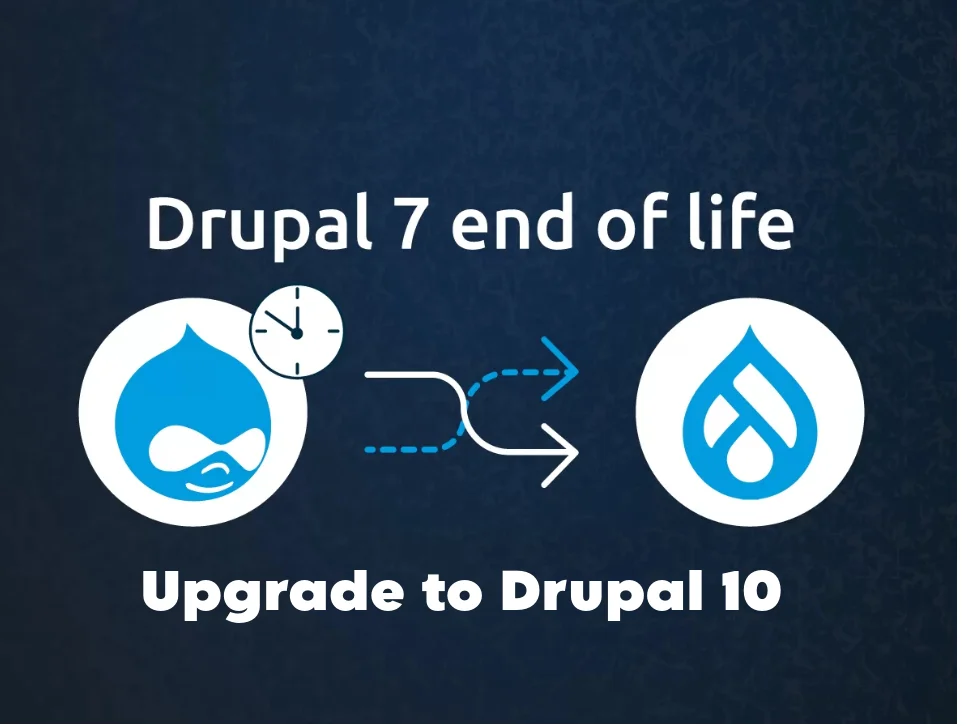Why You Need to Migrate from Drupal 7 Now and How to Do It Successfully
Why You Need to Migrate from Drupal 7 Now and How to Do It Successfully

As the end-of-life (EOL) for Drupal 7 looms on the horizon, businesses relying on this version must seriously consider upgrading to Drupal 10. The official EOL for Drupal 7 is set for January 2025, and a significant reduction in support and security fixes began as early as August 2023. This imminent deadline makes migration a necessity rather than a choice for organizations that prioritize security, functionality, and overall digital experience.
Why Migrate from Drupal 7?
- Security Risks: As Drupal 7 reaches its EOL, the community support that keeps your website secure will diminish. Without regular security updates, your site becomes vulnerable to attacks, leading to potential data breaches and downtime.
- Lack of Compatibility: Many third-party modules and themes have stopped updating for Drupal 7. This means new features or integrations you may want to implement might not be compatible, limiting the growth and evolution of your digital presence.
- Improved Performance: Drupal 10 offers enhanced performance capabilities, including faster page loads, better caching, and more efficient backend processes. Upgrading will ensure your website runs smoothly and can handle modern web traffic demands.
- Better User Experience: Drupal 10 comes with a more intuitive interface, better accessibility features, and more flexibility for content creators. This leads to a better experience not just for your visitors but also for your internal teams managing the website.
- Future-Proofing Your Business: Staying on outdated software hampers innovation. By migrating to Drupal 10, you ensure that your website is built on a modern, scalable platform ready to support your business needs now and in the future.
Guide to Drupal 7 Migration
1. Planning Your Migration
- Assess Your Current Site: Start by auditing your current Drupal 7 site. Identify all modules, themes, and custom code to determine what needs to be migrated or replaced.
- Develop a Migration Plan: Create a comprehensive migration plan that includes timelines, responsibilities, and risk management strategies. Ensure all stakeholders are informed and onboard with the plan.
2. Preparing for the Migration
- Backup Everything: Before beginning the migration, take a full backup of your site, including the code, files, and database. This will serve as a safety net in case anything goes wrong during the migration.
- Choose the Right Tools: Familiarize yourself with Drupal’s migration tools, particularly the ones designed for moving from Drupal 7 to Drupal 10. In some cases, you may need to migrate to Drupal 9 first before upgrading to Drupal 10.
3. Executing the Migration
- Test in a Staging Environment: Run your migration in a staging environment to identify and fix any issues before going live. This ensures that your live site remains uninterrupted.
- Module and Theme Updates: Update your custom modules and themes for compatibility with Drupal 10. This step may require significant rewriting of code, especially for custom features.
4. Post-Migration Activities
- Quality Assurance Testing: After the migration, conduct thorough QA testing to ensure all site functionalities are working as expected. Pay special attention to critical business workflows and user experience.
- SEO and Performance Optimization: Reevaluate your site’s SEO performance post-migration. Make any necessary adjustments to maintain or improve your search engine rankings. Also, optimize performance by clearing caches and updating server settings.
5. Ongoing Maintenance and Support
- Training and Documentation: Provide training for your team on the new features and changes in Drupal 10. Document the migration process to build a knowledge base for future upgrades.
- Monitoring and Updates: Regularly monitor your site’s performance and security, and be proactive in applying updates and patches to keep your site secure and running smoothly.
Book a Discovery Call with SV Infotech
Migrating from Drupal 7 to Drupal 10 is a complex and critical project that requires careful planning and execution. At SV Infotech, we have extensive experience in managing Drupal migrations, ensuring a smooth and successful transition. Let us handle the technical complexities while you focus on your core business.
Book a Discovery Call Today to discuss your Drupal 7 migration and how we can tailor the process to meet your unique needs. Your seamless transition to Drupal 10 starts with a conversation. Let’s ensure your website remains secure, functional, and future-proof.